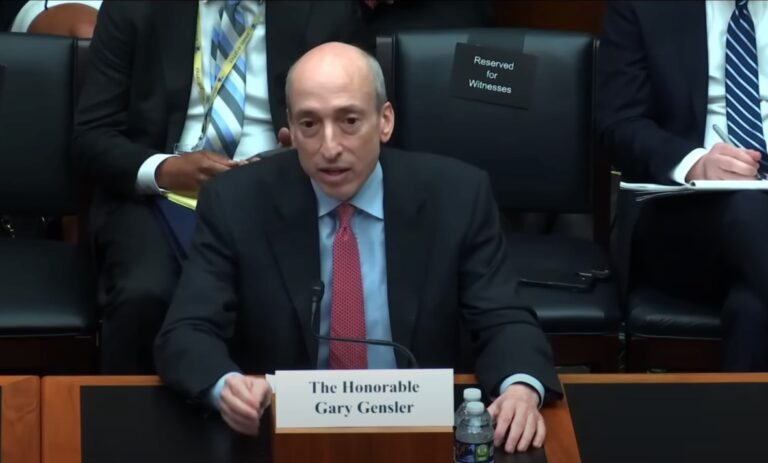In a heated hearing on April 18, U.S. Securities And Exchange Commission (“SEC”) Chair Gary Gensler clashed with Republicans over digital asset regulation, highlighting the urgent need for clear crypto rules.
On April 18, 2023, Gensler testified before the House Financial Services Committee’s “Oversight of the Securities and Exchange Commission” hearing. The hearing showcased the growing tensions between the SEC and congressional Republicans, particularly regarding the regulation of digital assets and the need for clear rules to foster innovation and protect investors in the crypto market.
Before the hearing, Republicans on the committee, led by Chairman Patrick McHenry, sent a letter to Gensler criticizing the SEC’s approach to digital asset regulation. The Republicans accused the SEC of forcing digital asset trading platforms to register under the national securities exchange (NSE) framework, which they argued was an ill-fitting framework for digital assets. The letter emphasized the importance of developing clear rules for digital assets to foster innovation and protect investors while criticizing the SEC’s current approach as harmful to the digital asset ecosystem, consumers, and the economy.
The letter further highlighted the lack of clarity provided by the SEC regarding what digital assets are considered securities, making it difficult for NSEs to list such assets. It also accused Gensler of misleading firms by pushing them to register without providing a clear registration process. The Republicans urged Gensler and the SEC to work with Congress to ensure innovators and investors have the regulatory clarity and protections they deserve.
In his prepared remarks for the hearing, Gensler addressed the crypto market and emphasized that most crypto tokens are considered securities. He stressed the importance of compliance with securities laws, stating that “it’s the law; it’s not a choice.” Gensler pointed out that crypto intermediaries often combine various functions such as exchange, broker-dealer, custodial, clearing, and lending, leading to potential conflicts of interest and risks for investors. He argued that crypto investors should benefit from the same protection as other investors, and that calling oneself a DeFi platform does not excuse defying securities laws.
Gensler highlighted the current noncompliance in the crypto market, which not only endangers investors but also jeopardizes public trust in capital markets. He noted that the SEC has taken action to address this issue through enforcement actions and rule proposals. For instance, the best execution rule would cover all securities, including cryptoasset securities, and the investment adviser custody rule would be updated to cover all crypto assets and enhance the protections provided by qualified custodians.
Additionally, Gensler mentioned that the SEC staff had stated their views on public company accounting related to crypto assets and disclosure regarding significant crypto asset market developments. He also highlighted that the SEC announced on April 14 that it was reopening the comment period and providing supplemental information for proposed amendments to the definition of “exchange” under Exchange Act Rule 3b-16.
Gensler emphasized that forsaking investor protection puts real people’s life savings at risk and that regulation aims to protect U.S. investors. He quoted Justice Thurgood Marshall, who said, “Congress’s purpose in enacting the securities laws was to regulate investments, in whatever form they are made and by whatever name they are called.” Gensler reiterated that Congress has given the SEC a mandate to protect investors, regardless of the labels or technology used, and stressed that nothing about the crypto markets is incompatible with securities laws.
According to CryptoLaw’s excellent report on Twitter about the hearing, GOP committee members led by Chairman Patrick McHenry grilled Gensler on the SEC’s handling of crypto. McHenry criticized Gensler’s “rushed” rulemaking process, claiming it caused harm and lacked rigor or evidence bases. He also confronted Gensler on the contradictory guidance surrounding Ethereum (ETH), asking whether it is a commodity or a security. Gensler did not provide a clear answer, leading to further confrontations between the two.
Other representatives questioned Gensler on actions the SEC has taken that would prevent banks from being able to custody digital assets and expressed surprise that the SEC seemed unaware of certain operational aspects of major crypto platforms, such as FTX. Representative Andy Barr questioned Gensler on this topic and criticized the SEC’s lack of knowledge about FTX’s operational details, like its reliance on Quickbooks.
Representative Tom Emmer slammed Gensler for the SEC’s failure to provide clear rules for crypto firms and accused him of incompetence. Emmer asked Gensler about his meetings with FTX and Terra Luna before their respective challenges and reminded him of his public statement on Kraken staking. Emmer argued that Gensler’s public statements were not regulations and accused him of being disingenuous in his comments about stablecoins, as they were his personal views rather than official guidance.
Emmer went on to criticize Gensler for his handling of digital assets, stating, “You’ve been an incompetent cop on the beat, doing nothing to protect Americans.” This sentiment was echoed by other Republicans on the committee, who expressed frustration with the SEC’s approach to digital asset regulation and its perceived lack of clarity and guidance for the crypto market.
Here is a video of the entire hearing:








